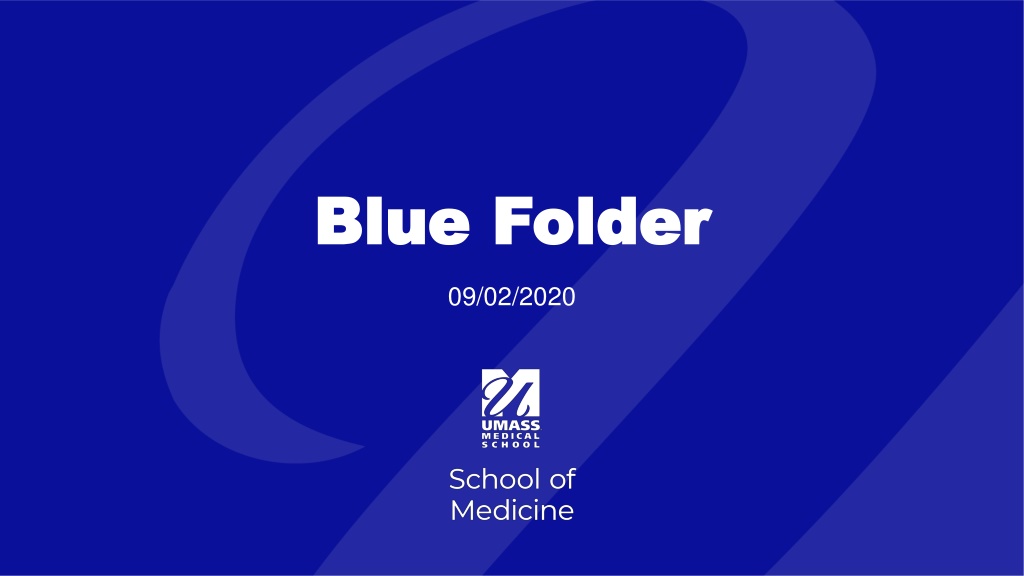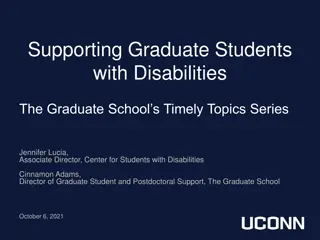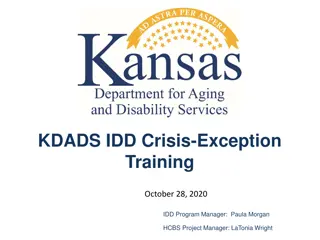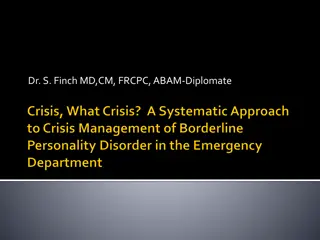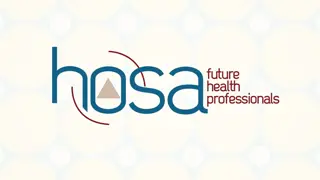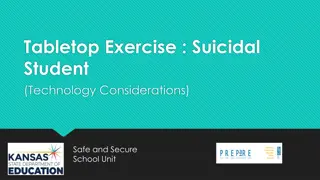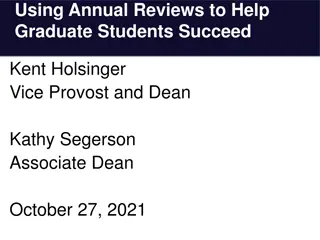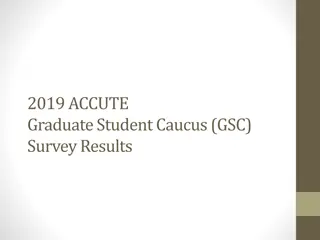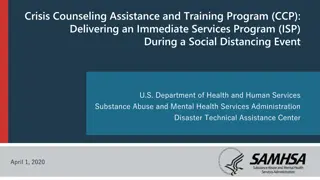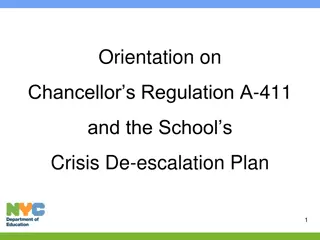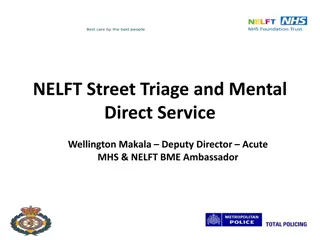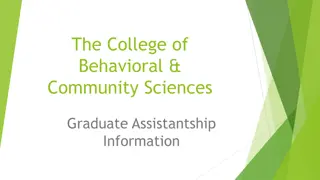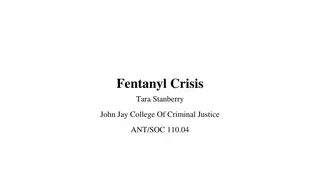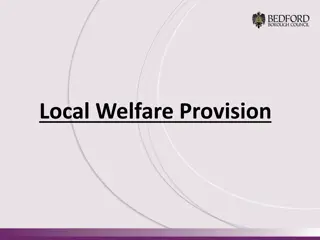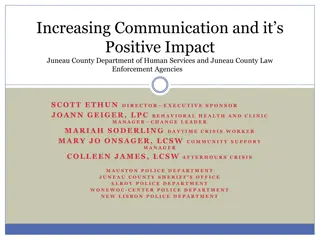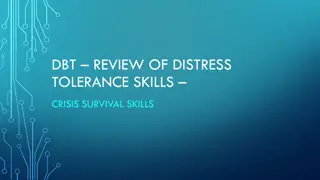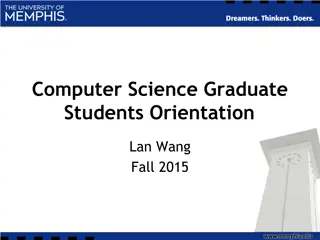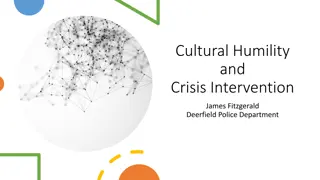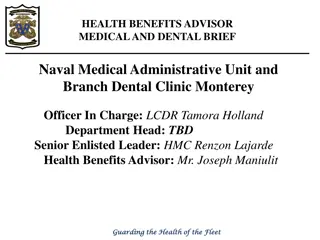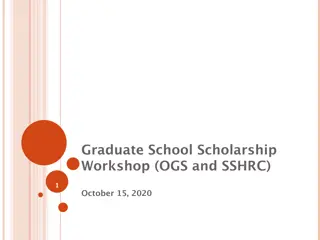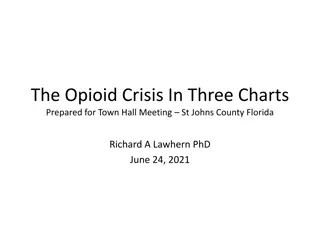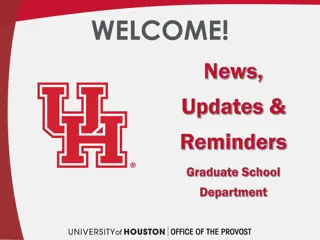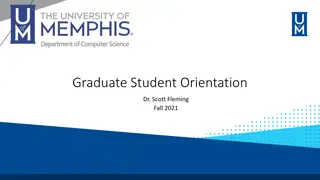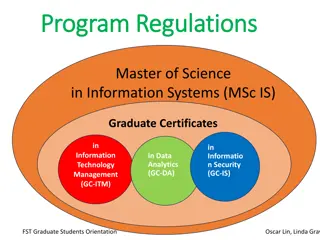Recognizing and Supporting Medical and Graduate Students in Crisis
This content provides guidance on recognizing and assisting medical and graduate students who may be in distress or crisis. It emphasizes the importance of proactive support, understanding laws and policies, and promoting a safe and supportive environment. Tips include sharing knowledge, setting expectations, listening sensitively, reporting concerns, practicing self-care, and de-escalating situations with distressed students.
Download Presentation

Please find below an Image/Link to download the presentation.
The content on the website is provided AS IS for your information and personal use only. It may not be sold, licensed, or shared on other websites without obtaining consent from the author. Download presentation by click this link. If you encounter any issues during the download, it is possible that the publisher has removed the file from their server.
E N D
Presentation Transcript
Blue Folder Blue Folder 09/02/2020
Recognizing and Helping Medical and Graduate Students Recognizing and Helping Medical and Graduate Students Needing Support or Experiencing Crisis or Distress Needing Support or Experiencing Crisis or Distress Faculty, Student and Staff - CRISIS RESOURCES Where do I start? If you are concerned about a student, don t let uncertainty stop you from taking action to help. UMass Medical School is committed to supporting students and has created this guide, based off the Maroon Folder created by the UMatter team at UMass Amherst to help you Recognize, Respond to, Refer and Report concerns about your students. For additional information, talk to your supervisor or department chair and contact the Dean of Students Main Office at 508-856-2227. Share what you know Students in hardship are sometimes reluctant to share their status. Sharing what you know allows the appropriate university staff to proactively reach out with support and resources. State and federal laws and University policies mandate reporting in many crisis situations Clarify your expectations Your syllabus can send a positive signal of support for students learning and well-being and set early limits on disruptive or self-destructive behaviors. Consider including a section with support resources and encourage students to seek help when they need it. Remind students of support resources and standards/ expectations for conduct. Familiarize yourself with the guiding language for student behavior in the Code of Student Conduct. Listen sensitively and carefully Vulnerable students need to be heard and helped. They may find it difficult to articulate their distress or hardship. Ask directly if they need support, if they feel their functioning is impaired, or if they have thoughts of harming themselves or others. Threats to harm self or others should be immediately reported to University Police at 508-856-3296 or call 911 or 6-3311 and the respective office of student affairs. Always report serious or persistent behavior Your firsthand knowledge and personal connection to your student is valuable in understanding and appropriately responding to their situation. To coordinate a timely response, report serious or persistent behavior to the Dean of Students Main Office as soon as possible. Misconduct may be formally addressed through the Student Conduct process and additional campus resources may be necessary to help reduce or eliminate disruptive behaviors. Stay safe If a student displays threatening or potentially violent behavior, you and the student s safety and the welfare of the campus community are the top priorities. Coordinated professional help and follow-up care are effective ways to prevent suicide and violence. Trust your instinct to take action Ask Is everything okay? If you are concerned about a student, consult your department chair, supervisor and the Dean of Students Main Office. Promptly report safety concerns and Student Conduct Code violations. Threats to harm self or others should be reported to University Police (508)-856-3296 or via 911 Practice self care Helping a troubled student can take a toll on your personal well-being. Make sure to acknowledge what you ve been through and take care of yourself. Support resources can be found through the Employee Assistance Program at 800-322-5327. De-escalate and support Distressed students can be sensitive. Avoid threatening, potentially embarrassing, or intimidating statements. Help students connect with the resources they need.
Recognize and Respond to Distress Recognize and Respond to Distress Emotional distress is an expression of pain and suffering. A person in distress may be upset, unhappy, or anxious. They may be experiencing depression or having suicidal thoughts. Difficult situations or life changes such as leaving home, starting school, or preparing to graduate can bring about emotional distress How to Help Someone behaving differently than usual, or saying upsetting things in person, online, or on the phone,may need your help. Reporting your concerns about a student s safety and well-being does not violate their privacy rights. What to Do if a Social Media Post Threatens Harm to Self or Others If someone may be in immediate danger, call 911 If the poster is a UMass student, contact Dean of Students Main Office Respond with compassion If person is expressing suicidal thoughts, encourage them to call the National Suicide Prevention Lifeline at 1-800-273- TALK (8255) Take screenshots of otherwise save content of post(s) in case they ae needed later for reference START: Find a quiet, comfortable place to talk. Don t promise to keep your discussions secret. ASK QUESTIONS: When did you begin feeling like this? How can I best support you? Avoid saying, I know how you feel. CONNECT: Pay attention and avoid distractions. OFFER HOPE: Let the person know you care and that help is available. Before ending the conversation, agree together on a next step, like planning a follow-up conversation or connecting with professional help. ASK: Use phrases that show you want to help. It seems like you re having a hard time. I d like to hear about it. I wanted to check in, because you haven t seemed yourself lately. KNOW YOUR LIMITS: A situation may be more than you can handle. Get help from a crisis line, mental health professional, or a medical provider. If the person is reluctant to call, offer to sit with them while they do, or call for them. To report threats of harm made on social media: Facebook Flag the post by clicking or tapping the arrow in the top-right corner of the post. Select I think it shouldn t be on Facebook. Select It s hurtful, threatening or suicidal. Select I think they might hurt themselves LISTEN: Take in what the person is saying without judgment, assumptions,or interruptions. Let them know you believe them and take them seriously. Paraphrase and repeat back their words to make sure you fully understand. ACT IN AN EMERGENCY: Twitter - Click dropdown menu to right of Tweet s like icon and select Report Tweet Choose either It displays a sensitive image or Its abusive or harmful. Alternatively use this link: https://support.twitter.com/forms/suicide If someone is in danger, call UMass Police Department (UMPD) on campus, (413) 545-3111, or 911 off campus. If it is safe to do so, stay with the person in distress until help arrives. Instagram Tap the three dots on the right of the person s username. Tap Report. After hitting report you have two options. Choose option It s inappropriate > self injury Snapchat Email your concerns to safety@snapchat.com YouTube Go to the video you want to report. Tap More (three dots) at the top of the video. Tap Report Select the appropriate reporting option
Maintaining Compliance with State and Federal Laws and Maintaining Compliance with State and Federal Laws and University Policies University Policies UMMS Appropriate Treatment of Learners Policy Title IX - Investigative Policy and Procedure Hazing It is the policy of the University of Massachusetts Medical School ( UMMS ) [the University of Massachusetts Worcester ( UMW )] to comply with Title IX of the Education Amendments of 1972 ( Title IX ), 20 U.S.C. 1681 et seq., and its implementing regulations, 34 C.F.R. Part 106, which prohibit discrimination on the basis of sex in education programs or activities operated by recipients of Federal financial assistance. Sexual harassment of students, which includes acts of sexual violence, is a form of sex discrimination prohibited by Title IX. Sexual violence refers to physical sexual acts perpetrated against a person s will or where a person is incapable of giving consent due to the victim s use of drugs or alcohol or due to an intellectual or other disability. A number of acts may fall into the category of sexual violence, including rape, sexual assault, sexual battery, non-consensual video or audio taping of sexual activity, domestic violence, dating violence, stalking incidents and sexual coercion. All such acts of sexual violence are forms of sexual harassment covered under Title IX. University of Massachusetts Medical School in accordance with Massachusetts General Laws, Chapter 269, Sections 17, 18 and 19 (Jan. 5, 1988) does not tolerate any form of hazing. Massachusetts General Laws, Chapter 269, Sections 17, 18 and 19 contain the following: The University of Massachusetts Medical School ( UMMS ) is committed to providing a supportive and respectful learning environment that fosters mutual trust and understanding between learners and members of the educational community. Accordingly, UMMS has developed this Appropriate Treatment of Learners ( ATL ) policy to address concerns regarding the inappropriate treatment of learners by any member of the educational community. Section 17: Whoever is a principal organizer or participant in the crime of hazing, as defined herein, shall be punished by a fine of not more than three thousand dollars or by imprisonment in a house of correction for not more than one year or both such fine and imprisonment.The term hazing as used in this section and in Sections 18 and 19, shall mean any conduct or method of initiation into any student organization, whether on public or private property, which willfully or recklessly endangers the physical or mental health of any student or other person. Such conduct shall include whipping, beating, branding, forced calisthenics, exposure to weather, forced consumption of any food, liquor, beverage, drug or other substance, or any other brutal treatment or forced physical activity which is likely to adversely affect the physical health or safety of any student or other person, or which subjects such student or other person to extreme mental stress, including extended deprivation of sleep or rest or extended isolation.Notwithstanding any other provisions of this section to the contrary, consent shall not be available as a defense to any prosecution under this action. To the extent possible, it is the policy of UMMS to provide a learning environment that fosters mutual trust and understanding between teachers and students. When all participants in the educational process at UMMS understand and uphold the standards of appropriate treatment of students, the environment enhances teaching, learning and professional development, to the benefit of all. The purpose of this complaint policy is to provide an avenue for prompt follow-up on allegations of inappropriate treatment, and to do so in a non-adversarial and respectful manner that satisfies all parties involved. Should investigation of a complaint be warranted, UMMS is committed to conducting it thoroughly, promptly, and impartially. The language, terms and requirements of this Policy supersede and supplant any inconsistent or conflicting language in any other UMMS policy. The UMMS employee to whom claims shall be reported under this Policy and who shall be responsible for administering this Policy is UMMS Title IX Coordinator as designated by UMMS Provost. This policy is designed for any student who believes s/he has been subjected to inappropriate treatment under the standards defined for this campus. These standards, which adhere to AAMC guidelines and LCME accreditation requirements, apply to the School of Medicine, Graduate School of Biomedical Sciences, Graduate School of Nursing, Graduate Medical Education, and to any UMMS school hereinafter established Refer to the student handbook for the full hazing policy.
Maintaining Compliance with State and Federal Laws and Maintaining Compliance with State and Federal Laws and University Policies University Policies Religious/Ethical Matters: Requesting accommodation for religious holidays and activities-continued Student Clinical Education Hours Policy Civility Statement As working significant numbers of hours continuously has been shown to contribute to reduction in performance and increased incidence of significant errors in work, the clinical faculty of the University of Massachusetts Medical School require the following: In order to allow medical students to perform maximally, to effectively assist in the clinical care of patients and to learn from their patients clinical medical students will be expected to follow ACGME PGY-2 clinical work hour restrictions. The University of Massachusetts Medical School is a large diverse community committed to a civil, respectful and humane workplace. Our commitment to civility contributes to the recruitment and retention of top talent: as a result, we uphold the dignity of the individual in the following ways: Applicability: This policy applies to any UMMS student who, because of religious beliefs or practice, believes that s/he is unable to attend a class, participate in any examination, or in other ways fulfill an educational requirement of any course, clerkship or other required activity. Conducting ourselves with integrity, courtesy and respect toward fellow members of our UMMS community; Holding individuals accountable for their actions and; Promoting an environment where individuals feel safe 1. Policy: Recognizing that the religious diversity of its students may result in conflicts between students religious beliefs/practices and certain educational activities, UMMS will attempt to make accommodations that honor the primacy of its commitment to patient care and do not unduly burden faculty or disproportionately affect the general student population involved in the affected educational activity. Students who believe they have a need for religious accommodation during any course, clerkship or other required educational activity shall notify the relevant instructor/preceptor as soon as possible after an impending conflict becomes apparent preferably prior to or at the beginning of the course, clerkship or other activity. 2. 3. Religious/Ethical Matters: Requesting accommodation for religious holidays and activities Principle: The purpose of this policy is to acknowledge respect for the religious diversity of UMMS students by providing opportunities, where possible, for accommodation in cases where genuine conflicts exist between students religious beliefs/practices and educational activities. Such accommodations must honor the primacy of our commitment to patient care and not unduly burden faculty or disproportionately affect the general student population involved in the affected educational activity. If it is established that there is a legitimate need for the affected student(s) where possible, shall be provided reasonable accommodation, including the opportunity to make up the activity in conflict if this is indicated.
Maintaining Compliance with State and Federal Laws and Maintaining Compliance with State and Federal Laws and University Policies University Policies Discrimination Complaint and Procedures Sexual Harassment Policy Policy Statement The Medical School is firmly committed to working to ensure that all employees, students and individuals who are authorized to conduct business with and/or on behalf of the Medical School are not harassed or discriminated against in any form. To that end, it is the policy of the Medical School to comply with all federal and state anti- discrimination laws and regulations, including those covering affirmative action: Executive Order 11246 Titles VI and VII of the Civil Rights Act of 1964, The Civil Rights Act of 1991, Sections 503 and 504 of the Rehabilitation Act of 1973, Americans with Disabilities Act of 1990, Age Discrimination Act of 1967, Equal Pay Act of 1963, the Genetic Information Nondiscrimination Act of 2008 (GINA), Veterans Assistance Act of 1972 and Commonwealth of Massachusetts Executive Orders 74 and 143 and Massachusetts Chapter 151B, as well as other applicable state and federal laws. Policy Statement The MedicalSchool is firmly committed to working to ensure that all employees, students and individuals who are authorized to conduct business with and/or perform other services on behalf of the MedicalSchool are not subject to sexual harassment. To that end, it is the policy of the MedicalSchool to comply with all federal and state laws and regulations: Title VII of the Civil Rights Act of 1964, Chapter 151B, and M.G.L. 151B Sec. 3A. Retaliation against an individual for filing a complaint of sexual harassment or against any individual for cooperating in an investigation of a complaint, is against the MedicalSchool policy and it is against the law. If retaliation is found to have occurred, appropriate action(s) will be taken. The Family Education Rights and Privacy Act (FERPA) The Family Educational Rights and Privacy Act (FERPA) is a federal law that allows present and former students access to their educational records and provides basic privacy protection. Educational records are defined as those directly related to a student and maintained by an educational agency or institution. Reason for Policy To provide a learning and working environment that is free of sexual harassment in the form of unwelcome physical advances, requests for sexual favors, and verbal or written communications of a sexual nature. Reason for Policy To provide a learning and working environment that is free of all forms of harassment and discrimination and is supportive of the right of all individuals to be treated with respect and dignity. FERPA permits disclosure of personal identifiable information from a student s educational record to parents, police or others to protect the health and safety of the student or other individuals. Information can be shared with university personnel when there is a specific need to know. Entities Affected By This Policy The policy and procedures for resolution apply to all employees, students and individuals who are authorized to conduct business with and/or perform other services on behalf of the University of Massachusetts Medical School who believe that they have been sexually harassed. The policy and procedures also address the concerns of any person who has a sexual harassment complaint brought against them. Entities Affected By This Policy The policy and procedures for resolution apply to all employees, students and individuals who are authorized to conduct business with and/or perform other services on behalf of the University of Massachusetts Medical School who believe they may have been harassed or discriminated against on the basis of race, color, creed, religion, gender (including pregnancy, childbirth, or related medical conditions) age, sexual orientation, gender identity and expression, genetic information, national origin, covered veteran status, disability, ancestry or any other characteristic protected by law. Observations of a student s conduct or statements made by a student are not part of a student s educational record and should be appropriately shared. This allows faculty and staff to discuss student health and safety concerns with relevant campus offices trained to handle situations with sensitivity and care. Taking appropriate action does not violate a student s privacy.
A STEP A STEP- -BY BY- -STEP GUIDE FOR FACULTY, STUDENT AND STAFF STEP GUIDE FOR FACULTY, STUDENT AND STAFF Step 2: RESPOND Step 3: REFER Step 1: RECOGNIZE Responding to a person in need can be difficult. Conversations about emotions and feelings may seem awkward. Think about these things when responding: Express concern and care Find a comfortable private place for the conversation Avoid criticizing, judgements, and blame Listen for understanding not responses Be supportive Knowing available resources and offering those as options to the person is important. UMMS Police Student Counseling Services UMMS Emergency Mental Health School Specific Associate/Assistant Deans for Student Affairs Director for Positive Learning Environment Diversity and Inclusion Office Recognizing the behavior or change in behavior of a someone in need or distress is the first step in helping. Changes can include: Abrupt changes in mood Abrupt changes in appearance (grooming habits or looking disheveled) Change in the quality of work Change in attitude Step 4: REPORT When in doubt, report! If you have any question as to the need to report something, simple report it. For urgent on campus issues 24/7 call the UMMS Police at 508.856.3296 or call 911 For urgent off campus issues call 911 Student Counseling Services offers advise and consultation during normal business hours at 508.856.3220 Each School has a student affairs contact that can be reached during normal business hours: School of Medicine, Associate Dean of Student Affairs, 508.856.2227 Graduate School of Nursing, Student Affairs Specialist, 508.856.5756 Graduate School of Biomedical Sciences, Assistant Dean for Student Affairs, 508.856.6074 Director of Positive Learning, 508.856.1830 Title XI Coordinator, 508.856.2179 Disability Services, 774.455.4804 Diversity and Inclusion Office, 508.856.2179
PART 2 RECOGNIZE RESPOND REFER REPORT Disturbing content in paper/emails Decline in academic performance Excessive absenteeism, irrational or bizarre behavior Sudden change in demeanor (from extroverted to withdrawn, organized to forgetful, etc.) Significant changes in appearance, behavior, or personal hygiene Express concern and care Give an example of a time that the student s behavior has worried you Listen to and believe student s responses Be supportive and encouraging if student agrees to get help Call 911 if there is a potential threat to student s safety or the safety of others SOM Associate Dean for Student Affairs: (508) 856-2227 GSN Director of Student Affairs: (508) 856-5756 GSBS Assistant Dean of Student Affairs and Enrollment: (508) 856-6074 Not sure what, but something s wrong Urgent: Call 911 UMMS Police: (508) 856-3296 Advice and consultation: Student Counseling Services: (508) 856-3220 Decline in academic performance Written or verbal statements preoccupied with theme of death or that convey intent to harm self or others Fresh cuts, scratches or other wounds Withdrawal from classes, activities, and friends Statements of hopelessness such as, I hate this life or Everyone is better off without me SOM Associate Dean for Student Affairs: (508) 856-2227 GSN Director of Student Affairs: (508) 856-5756 GSBS Assistant Dean of Student Affairs and Enrollment: (508) 856-6074 Self harm, suicide ideation, suicidal risk Call 911 if there is a potential threat to student s safety or the safety of others Express concern and care Always take suicidal statements, thoughts or behaviors very seriously If you suspect a student may be suicidal, seek immediate consultation Urgent: Call 911 UMMS Police: (508) 856-3296 UMMS Emergency Mental Health: (508) 334-3562 Advice and consultation: Student Counseling Services: (508) 856-3220 Intoxicated/high in class or at meetings/events Excessive sleepiness or hyper energy Decline in academic performance References to alcohol or drug use in conversations, papers, projects, etc. Deterioration in physical appearance (bloodshot eyes, dilated pupils, trembling hands, etc.) Express concern and care Give an example of a time that the student s behavior has worried you Be supportive and encouraging if the student agrees to get help; refer student to appropriate resources SOM Associate Dean for Student Affairs: (508) 856-2227 GSN Director of Student Affairs: (508) 856-5756 GSBS Assistant Dean of Student Affairs and Enrollment: (508) 856-6074 Alcohol, marijuana, or other drug abuse Urgent: Call 911 UMMS Police: (508) 856-3296 Advice and consultation: Student Counseling Services: (508) 856-3220 Excessive worry, guilt or nervousness Decline in academic performance; inability to stay focused in class Physical symptoms such as difficulty breathing; pounding or racing heart; numbness, tingling, sweating or chills; weakness or dizziness; jaw pain and teeth grinding; chest or stomach pain Express concern and care Avoid criticizing, blaming, sounding judgmental, or minimizing the situation Recommend (or, if necessary, insist upon) intervention SOM Associate Dean for Student Affairs: (508) 856-2227 GSN Director of Student Affairs: (508) 856-5756 GSBS Assistant Dean of Student Affairs and Enrollment: (508) 856-6074 Anxiety, stress, panic Urgent: Call 911 UMMS Police: (508) 856-3296 UMMS Emergency Mental Health: (508) 334-3562 Advice and consultation: Student Counseling Services: (508) 856-3220 Act(s) directed against a person or property on the basis of race, color, religion, creed, sex, age, marital status, national origin, mental or physical disability, political belief or affiliation, veteran status, sexual orientation, gender identity and expression, genetic information or any other class protected from discrimination under state or federal law Express concern and care Listen to and believe student s responses Avoid criticizing, blaming, sounding judgmental, or minimizing the situation Encourage student to save photos, communications, or other evidence Do not remove any evidence prior to reporting (e.g. clean graffiti, erase whiteboard, etc.) SOM Associate Dean for Student Affairs: (508) 856-2227 UMMS Police: (508) 856-3296 Diversity and Inclusion Office: (508) 856-2179 Bias incident Urgent: Call 911 UMMS Police: (508) 856-3296 Advice and consultation: Diversity and Inclusion Office: (508) 856-2179 Report graffiti for removal: EBS: (508) 856-3825 Internet flaming, trolling, name-calling, or harassment Threats to release private information/photos Identity theft Account hacking Express concern and care Encourage student to update all account passwords and privacy settings Encourage student to keep a log of bullying/harassing behavior; take and save screenshots of online harassment (Snapchat, Instagram, Facebook, etc.); save copies of all communications including texts, voicemails, and pictures SOM Associate Dean for Student Affairs: (508) 856-2227 GSN Director of Student Affairs: (508) 856-5756 GSBS Assistant Dean of Student Affairs and Enrollment: (508) 856-6074 Cyber misbehavior (identity or password theft, cyberbullying, online harassment) Urgent: Call 911 UMMS Police: (508) 856-3296 Advice and consultation: Student Counseling Services: (508) 856-3220
PART 3 RECOGNIZE RESPOND REFER REPORT Frequent or extended absences Decline in academic performance Mentions relationship, financial, or other challenges Difficulty concentrating and making decisions Exhaustion/fatigue Excessive worry, sleeping/eating problems Express concern and care Avoid criticizing, blaming, sounding judgmental, or minimizing the situation Listen to and believe student s responses Provide student with resources: Single Stop Resources Dean of Students Main Office Be supportive and encouraging if the student agrees to get help SOM Associate Dean for Student Affairs: (508) 856-2227 GSN Director of Student Affairs: (508) 856-5756 GSBS Assistant Dean of Student Affairs and Enrollment: (508) 856-6074 Economic hardship (loss of housing, food insecurity, financial emergency) Urgent: Call 911 UMMS Police: (508) 856-3296 Advice and consultation: Student Affairs (per school) UMMS IT: 508-856-8643 Student mentions struggling due to disability Student expresses concerns such as difficulty reading, concentrating, or memorizing; challenges with organizing tasks, homework, or deadlines; or other issues potentially related to a potential undiagnosed disability Express concern and care Listen to and believe student s responses Avoid stigmatizing behaviors such as criticizing, blaming, sounding judgmental, overly emphasizing or minimizing the situation Provide student with a referral to Disability Services Be supportive and encouraging SOM Associate Dean for Student Affairs: (508) 856-2227 Diversity and Inclusion Office: (508) 856-2179 (for discrimination purposes) Student ADA Director: (774) 455-4804 Disability related challenge Advice and consultation: Diversity and Inclusion Office: (508) 856-2179 (for discrimination purposes) Student ADA Director (774) 455- 4804 Unwarranted interruptions Slurs or other forms of intimidation Rude or abusive behavior Failure to adhere to instructor s directions When to call UMPD for immediate assistance: Throwing items, refusing to leave, threat of harm to self or others, preventing others from leaving, physically abusive behavior, showing or stating the presence of a weapon SOM Associate Dean for Student Affairs: (508) 856-2227 GSN Director of Student Affairs: (508) 856-5756 GSBS Assistant Dean of Student Affairs and Enrollment: (508) 856-6074 Disruptive classroom behaviors Call 911 if there is a potential threat to student s safety or the safety of others Express concern and care Explain the impact of student s behavior on the group or class Outline your expectations verbally and in your syllabus and help student explore options and alternatives such as Ombud's office, academic dean Urgent: Call 911 UMMS Police: (508) 856-3296 Advice and consultation: Student Counseling Services: (508) 856-3220 Student Affairs (per school) Withdrawal from activities and friends Exhaustion/fatigue Significant change in appearance or personal hygiene (e.g. wearing embarrassing or humiliating attire) Visible injuries or bruises Cuts, brands, or scars with a distinct pattern (e.g. symbols, initials, or Greek letters) SOM Associate Dean for Student Affairs: (508) 856-2227 GSN Director of Student Affairs: (508) 856-5756 GSBS Assistant Dean of Student Affairs and Enrollment: (508) 856-6074 Diversity and Inclusion Office: (508) 856-2179 Hazing Call 911 if there is a potential threat to student s safety or the safety of others Express concern and care Remain calm. Showing outrage may cause a student to shut down Do not interpret student s emotion (or lack of emotion) as evidence of a crime Listen to and believe student s responses Avoid criticizing, blaming, sounding judgmental, or minimizing the situation Urgent: Call 911 UMMS Police: (508) 856-3296 Advice and consultation: Student Counseling Services: (508) 856-3220 Student Health Services: (508) 334-8464 Communications that continue after being told to stop Threats to release private information/photos Display of sexually suggestive pictures or cartoons in workspace, residence halls, or online Verbal abuse, unwanted sexual flirtations Demand for sexual favors by peer or supervisor accompanied by implied or overt threat concerning an individual s academic status or employment SOM Associate Dean for Student Affairs: (508) 856-2227 GSN Director of Student Affairs: (508) 856-5756 GSBS Assistant Dean of Student Affairs and Enrollment: Title IX Administrator/DIO: (508) 856-2179 Harassment, sexual harassment, stalking Call 911 if there is a potential threat to student s safety or the safety of others Express concern and care Identify resources like CWC, DoS, and UMPD for safety planning Encourage student to save copies of all communications including texts, voicemails, and pictures Avoid promising confidentiality most university employees are Title IX responsible employees Urgent: Call 911 UMMS Police: (508) 856-3296 Advice and consultation: Student Counseling Services: (508) 856-3220 Diversity and Inclusion Office: (508) 856-2179
PART 4 RECOGNIZE RESPOND REFER REPORT Student in crisis while abroad: Mentions crisis or concern Decline in academic performance Excessive worry, sleeping/eating problems Uncommunicative and/or disengaged Student with status issue while studying in U.S. Mentions concern about visa or immigration status Decline in academic performance Difficulty concentrating and making decisions Excessive worry, sleeping/eating problems Uncommunicative and/or disengaged Express concern and care Avoid criticizing, blaming, sounding judgmental, or minimizing the situation Listen to and believe student s responses Be supportive and encouraging if the student agrees to get help Urgent: International Support Services Emergency #: (508) 340-0565 (24/7) Health (mental or physical) and/or /security advice and consultation: UMass Travel Assistance Policy: ADDN10892508 1-855-327- 1414 (US Toll Free) 1-630-694- 9764 (Direct Dial) International Support Services (medical or security incident) Phone: (508) 856-5746 Emergency Number: (508) 340-0565 (24/7) SOM Associate Dean for Student Affairs: (508) 856-2227 GSN Director of Student Affairs: (508) 856-5756 GSBS Assistant Dean of Student Affairs and Enrollment: (508) 856-6074 International crisis (for student abroad) or Immigration status issue (legal or visa issue, missing or stolen identity documents, etc.) Decline in academic performance Lack of peer engagement Excessive worry, sleeping/eating problems, fatigue Mentions lack of social relationships, homesickness, or other challenges including difficulties with social engagement, but may laugh it off References to loneliness or isolation in conversations, papers, projects, etc. Statements of isolation such as, I don t have any friends here, no one understands me, or I don t go to events because I don t want to go alone. Express concern and care Avoid minimizing the situation Provide student with resources: Learning Communities Peer mentoring Office of Student Affairs Suggest a campus event or registered student organization Be supportive and encourage student to connect to resources SOM Associate Dean for Student Affairs: (508) 856-2227 GSN Director of Student Affairs: (508) 856-5756 GSBS Assistant Dean of Student Affairs and Enrollment: (508) 856-6074 Isolation, loneliness, difficulty transitioning into or out of the university community Advice and Consultation: Student Counseling Services: (508) 856-3220 Student affairs (per school) Employee Assistance Program (EAP): (800) 322-5327 Learning Communities administrative assistant: (508) 856-2304 Frequent or extended absences Decline in academic performance Noticeable weight loss or gain Hair loss; pale or gray skin tone Difficulty with following directions, time management, or organization Struggles with academic performance Unusual or secretive eating habits; obsession with fat/ caloric content of food SOM Associate Dean for Student Affairs: (508) 856-2227 GSN Director of Student Affairs: (508) 856-5756 GSBS Assistant Dean of Student Affairs and Enrollment: (508) 856-6074 Known or suspected health or medical issues (chronic illness, depression, eating disorders, post- traumatic brain injury, etc.) Call 911 if there is a potential threat to student s safety or the safety of others Express concern and care Listen to and believe student s responses Recommend medical intervention Urgent: Call 911 UMMS Police: (508) 856-3296 Advice and consultation: Student Counseling Services: (508) 856-3220 Student Health Services: (508) 334-8464 Frequent or extended absences Decline in academic performance Mentions relationship, financial, or other challenges Difficulty concentrating and making decisions Exhaustion/fatigue Excessive worry, sleeping/eating problems Express concern and care Avoid criticizing, blaming, sounding judgmental, or minimizing the situation Listen to and believe student s responses Be supportive and encouraging if the student agrees to get help SOM Associate Dean for Student Affairs: (508) 856-2227 GSN Director of Student Affairs: (508) 856-5756 GSBS Assistant Dean of Student Affairs and Enrollment: (508) 856-6074 Personal or family tragedy, loss, or crisis (illness or death of family member, natural disaster, legal issues, divorce or break-up) Advice and Consultation: Student Counseling Services: (508) 856-3220 Student affairs (per school) References to sexual assault or relationship violence in conversations, papers, projects, etc. Visible injuries or bruises Mishaps or injuries with illogical/no explanation Crying or leaving when sexual violence, domestic violence, stalking, or child abuse is the topic Fearful or anxious about pleasing partner or others SOM Associate Dean for Student Affairs: (508) 856-2227 GSN Director of Student Affairs: (508) 856-5756 GSBS Assistant Dean of Student Affairs and Enrollment: (508) 856 6074 Relationship/ interpersonal violence, sexual assault, stalking Call 911 if there is a potential threat to student s safety or the safety of others Listen to and believe student s responses. Remain calm. Do not interpret student s emotions as evidence of assault or violence Avoid blaming, sounding judgmental, or minimizing the situation Identify resources for safety planning Recommend medical intervention Urgent: Call 911 UMMS Police: (508) 856-3296 Advice and consultation: Daybreak Domestic Violence Hotline: (508) 755-9030 Student Counseling Services: (508) 856 3220
